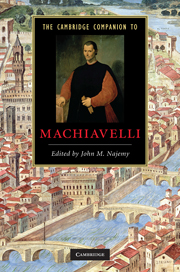Book contents
- Frontmatter
- Introduction
- 1 Niccolò Machiavelli: a portrait
- 2 Machiavelli in the chancery
- 3 Machiavelli, Piero Soderini, and the republic of 1494-1512
- 4 Machiavelli and the Medici
- 5 Machiavelli’s Prince in the epic tradition
- 6 Society, class, and state in Machiavelli’s Discourses on Livy
- 7 Machiavelli’s military project and the Art of War
- 8 Machiavelli’s Florentine Histories
- 9 Machiavelli and Rome: the republic as ideal and as history
- 10 Philosophy and religion in Machiavelli
- 11 Rhetoric and ethics in Machiavelli
- 12 Machiavelli and poetry
- 13 Comedian, tragedian: Machiavelli and traditions of Renaissance theater
- 14 Machiavelli and gender
- 15 Machiavelli’s afterlife and reputation to the eighteenth century
- 16 Machiavelli in political thought from the age of revolutions to the present
- Index
7 - Machiavelli’s military project and the Art of War
Published online by Cambridge University Press: 28 September 2010
- Frontmatter
- Introduction
- 1 Niccolò Machiavelli: a portrait
- 2 Machiavelli in the chancery
- 3 Machiavelli, Piero Soderini, and the republic of 1494-1512
- 4 Machiavelli and the Medici
- 5 Machiavelli’s Prince in the epic tradition
- 6 Society, class, and state in Machiavelli’s Discourses on Livy
- 7 Machiavelli’s military project and the Art of War
- 8 Machiavelli’s Florentine Histories
- 9 Machiavelli and Rome: the republic as ideal and as history
- 10 Philosophy and religion in Machiavelli
- 11 Rhetoric and ethics in Machiavelli
- 12 Machiavelli and poetry
- 13 Comedian, tragedian: Machiavelli and traditions of Renaissance theater
- 14 Machiavelli and gender
- 15 Machiavelli’s afterlife and reputation to the eighteenth century
- 16 Machiavelli in political thought from the age of revolutions to the present
- Index
Summary
The military occupies a paradoxical, if not controversial, place in Machiavelli scholarship. Most commentators agree that Machiavelli's concern with military affairs was at the heart of his political thinking and that the military crisis of contemporary Italy crucially influenced his views. It is widely recognized that Machiavelli considered force and military strength to be determining factors in relations among states. Scholars also concur that his involvement with the new Florentine militia ordinance of 1506 was an important formative experience during his chancery days and that the idea of a conscript army or citizen militia was a key element in his classically inspired republicanism. Despite this widespread acknowledgment of the role of the military in Machiavelli's thought, the Art of War (1521), his most systematic and detailed treatment of military organization and the methods of war, remains by far the least studied of his major works. How can this paradox be explained, and is this relative lack of interest in the Art of War justifiable? This chapter analyzes Machiavelli's military experience and writings on military matters and takes a critical look at the Art of War. By comparing this late work to the earlier memoranda Machiavelli composed in connection with the militia project and his theorizing on military affairs in The Prince and the Discourses, we will ask how and to what extent the Art of War contributes to our overall understanding of Machiavelli's political and military project, and in what way his military experience and the role he played in the militia ordinance of 1506 prepared, or anticipated, his views on military affairs in the major works.
- Type
- Chapter
- Information
- The Cambridge Companion to Machiavelli , pp. 112 - 127Publisher: Cambridge University PressPrint publication year: 2010
- 7
- Cited by

